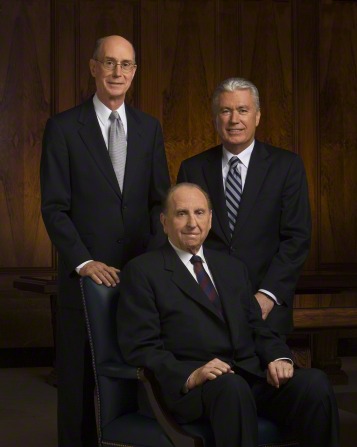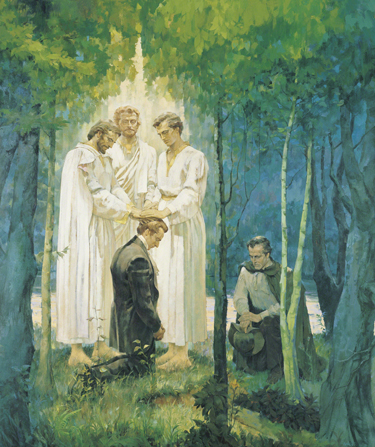 |
| Source |
1. "A prophet is a man called by God to be His
representative on earth. When a prophet speaks for God, it is as if God were
speaking (see D&C 1:38). A prophet is also a special witness for
Christ, testifying of His divinity and teaching His gospel. A prophet teaches
truth and interprets the word of God. He calls the unrighteous to repentance.
He receives revelations and directions from the Lord for our benefit. He may
see into the future and foretell coming events so that the world may be
warned" (Gospel Principles, p.39).
2. "Prophets... are given the priesthood–the
power and authority given to man to act in God's name for the salvation of His
children" (Preach My Gospel. p. 32)
3. "Surely the Lord GOD will do nothing, but he
revealeth his secret unto his servants the prophets" (Amos 3:7).
4. "Man shall not live by bread alone, but by
every word that proceedeth out of the mouth of God" (Matthew 4:4).
5. "He that receiveth [the apostles] receiveth
me, and he that receiveth me receiveth him that sent me. He that receiveth a
prophet... shall receive a prophet's reward" (Matthew 10:40-41).
Q Why do we need living prophets and apostles today?
6. "As members of The Church of Jesus Christ of
Latter-day Saints, we are blessed to be led by living prophets—inspired men
called to speak for the Lord, just as Moses, Isaiah, Peter, Paul, Nephi,
Mormon, and other prophets of the scriptures. We sustain the President of the
Church as our prophet, seer, and revelator—the only person on the earth who
receives revelation to guide the entire Church. We also sustain the counselors
in the First Presidency and the members of the Quorum of the Twelve Apostles as
prophets, seers, and revelators." (True to the Faith, Prophets).
7. "The Lord’s mouthpiece and prophet on the face
of the earth today received his [priesthood] authority through a line of
prophets going back to Joseph Smith, who was ordained by Peter, James, and
John, who were ordained by Christ, who was and is the head of the Church" (Teachings
of Presidents of the Church: Ezra Taft Benson, Chapter 11).
8. "Ye... are of the household of God; And are
built upon the foundation of the apostles and prophets, Jesus Christ himself
being the chief corner stone;.... And he gave some, apostles; and some,
prophets; and some, evangelists; and some, pastors and teachers; For the
perfecting of the saints, for the work of the ministry, for the edifying of the
body of Christ: Till we all come in the unity of the faith, and of the
knowledge of the Son of God, unto a perfect man, unto the measure of the
stature of the fulness of Christ: That we henceforth
be no more children, tossed to and fro, and carried about with every wind of
doctrine, by the sleight of men, and
cunning craftiness, whereby they lie in wait to deceive" (Ephesians
2:19-20; 4:11-14).
Q How do modern day prophets and apostles help to
perfect the saints, help us be united in faith, and keep us from going astray?
We testified to her that God had called apostles and prophets in our day, and that the message we were sharing was that God wanted to bring Christians to a unity of the faith and know His will concerning building His kingdom and blessing the world.
Jesus taught
that we can discern between true and false prophets by looking at their fruits,
or results in the lives of individuals who follow their teachings:
9. "Beware of false prophets, which come to you
in sheep's clothing, but inwardly they are ravening wolves. Ye shall know them
by their fruits" (Matthew 7:15-16).
10. "And by the power of the Holy Ghost ye may
know the truth of all things" (Moroni 10:5).
Blessings for Following God's Prophets and Apostles
Conditional Blessings of the Atonement of Jesus Christ: Forgiveness, salvation, exaltation, eternal families, hope, overcome weaknesses, godly character/divine attributes, self control, guidance, comfort, joy, peace, strength, healing, etc.
To receive the conditional blessings of the atonement, we must live the Gospel of Jesus Christ:
· Faith- belief in, trust in, and commitment to obey Christ
· Repent- submit will to Christ and change behavior to follow Him; seek forgiveness and a change of heart
· Covenants- make/keep promises by priesthood authority to follow the example of Jesus Christ, such as baptism.
· Holy Ghost- receive the Gift of the Holy Ghost, invite and follow His guidance
· Endure to the end- consistently grow our faith, repent, keep our covenants, and receive the Holy Ghost
|
Q How do modern day prophets and apostles help us to live the
gospel and receive the blessings of the atonement of Jesus Christ?
Q How did you gain a testimony of the importance of
following the counsel of modern day prophets and apostles?
Q How have you been blessed for following modern day
prophets and apostles? What difference have they made in your life?
11. "You can always trust
the living prophets. Their teachings reflect the will of the Lord, who
declared: 'What I the Lord have spoken, I have spoken, and I excuse not myself;
and though the heavens and the earth pass away, my word shall not pass away,
but shall all be fulfilled, whether by mine own voice or by the voice of my
servants, it is the same' (D&C 1:38).
"Your greatest safety lies in strictly following the word of the
Lord given through His prophets, particularly the current President of the
Church. The Lord warns that those who ignore the words of the living prophets
will fall (see D&C 1:14–16). He promises great blessings to those who
follow the President of the Church: “Thou shalt give heed unto all his words
and commandments which he shall give unto you as he receiveth them, walking in
all holiness before me; “For his word ye shall receive, as if from mine own
mouth, in all patience and faith. “For by doing these things the gates of hell
shall not prevail against you; yea, and the Lord God will disperse the powers
of darkness from before you, and cause the heavens to shake for your good, and
his name’s glory” (D&C 21:4–6)" (True to the Faith, Prophets).
12. "The most important prophet, so far as we are
concerned, is the one who is living in our day and age. This is the prophet who
has today’s instructions from God to us. God’s revelation to Adam did not instruct
Noah how to build the ark. Every generation has need of the ancient scripture,
plus the current scripture from the living prophet.… Beware of those who would
set up the dead prophets against the living prophets, for the living prophets
always take precedence.... If we want to know how well we stand with the Lord
then let us ask ourselves... how close do our lives harmonize with... The
living Prophet—President of the Church, and with the Quorum of the First
Presidency" (Teachings of Presidents of the Church: Ezra Taft Benson, Chapter
11).
Q Why is the most important prophet for us the
living prophet?
13. "Seek not to counsel the Lord, but to take
counsel from his hand. For behold, ye yourselves know that he counseleth in
wisdom, and in justice, and in great mercy, over all his works" (Jacob
4:10).
Q Why is it important for us to seek to take counsel
from prophets and apostles instead of seeking to counsel or criticize them?
Q Why does Satan want us to discount or dismiss the
teachings of prophets and apostles? How does he try to do this and how can we
avoid these pitfalls?
14. "I have been a
personal witness as both quiet inspiration and profound revelation have moved
to action the prophets and apostles, the other General Authorities, and the
auxiliary leaders. While neither perfect nor infallible, these good men and
women have been perfectly dedicated to leading the work of the Lord forward as
He has directed. And make no mistake about it: the Lord directs His Church
through living prophets and apostles....
"It has always been a challenge for the world to accept living
prophets and apostles, but it is... essential to do so in order to fully
understand the Atonement and the teachings of Jesus Christ and to receive a fulness
of the blessings of the priesthood.... Too many people think Church leaders and
members should be perfect or nearly perfect. They forget that the Lord’s grace
is sufficient to accomplish His work through mortals. Our leaders have the best
intentions, but sometimes we make mistakes....
"Looking for human weakness in others is rather easy. However, we
make a serious mistake by noticing only the human nature of one another and
then failing to see God’s hand working through those He has called. Focusing on
how the Lord inspires His chosen leaders and how He moves the Saints to do
remarkable and extraordinary things despite their humanity is one way that we
hold on to the gospel of Jesus Christ and stay safely aboard the Old Ship
Zion" (M. Russell Ballard, Oct 2015 General Conference).
15. "Another potential destroyer of spiritual
roots... is the keyhole view of the gospel or the Church. This limited view
focuses on a particular doctrine or practice or perceived deficiency in a
leader and ignores the grand panorama of the gospel plan and the personal and
communal fruits of its harvest.... To be securely rooted in the gospel, we must
be moderate and measured in criticism and seek always for the broader view of
the majestic work of God" (Dallin H. Oaks, April 2015 General Conference).
Concluding Thoughts
16. "This world is full of
so many self-help books, so many self-proclaimed experts, so many theorists,
educators, and philosophers who have advice and counsel to give on any and all
subjects. With technology today, information on a myriad of subjects is
available with the click of a keystroke. It is easy to get caught in the trap
of looking to the “arm of flesh” for advice on everything
from how to raise children to how to find happiness. While some information has
merit, as members of the Church we have access to the source of pure truth,
even God Himself.
"We would do well to search out answers to our problems and
questions by investigating what the Lord has revealed through His prophets.
With that same technology today, we have at our fingertips access to the words
of the prophets on nearly any subject. What has God taught us about marriage
and the family through His prophets? What has He taught us about
education and provident living through His prophets? What has He taught us
about personal happiness and fulfillment through His prophets?" (Kevin R.
Duncan, October 2010).
Where we can find the words of modern day prophets
and apostles:
- General Conference- twice a year church leaders give direction as to what the entire church should focus on
- Lds.org- church website that is the central source of church teachings, resources, and news
- Mormon.org- an introduction to the Church of Jesus Christ of Latter-day Saints
- Mormonchannel.org- video and audio presentations of church teachings
Key talks about prophets of God can be found at
Recent warnings for us from modern
apostles and prophets can be found at



